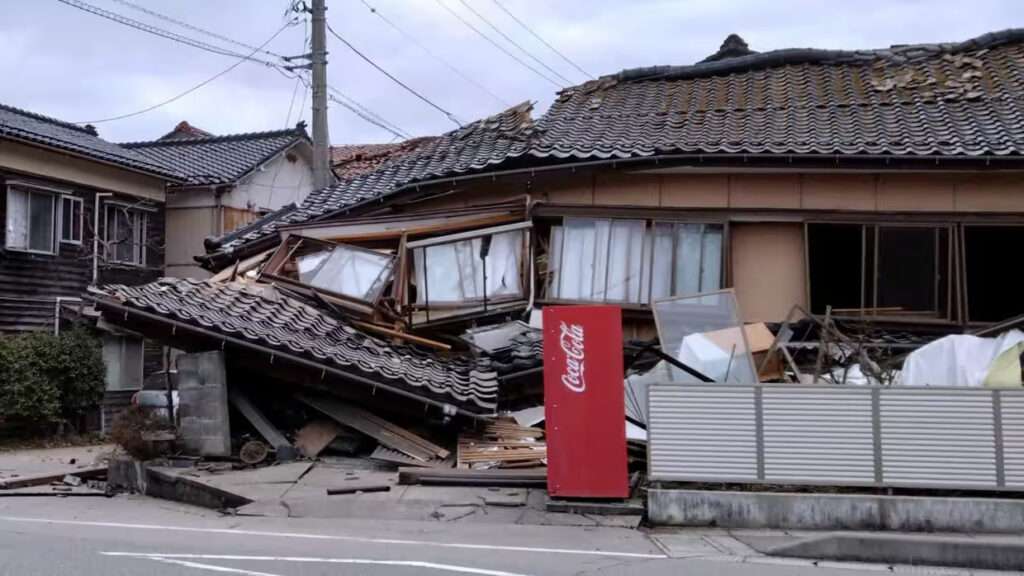Japan, a country known for its technological advancements, rich culture, and hospitable people, has recently faced a series of devastating earthquakes that have left the nation in shock. The quakes, which occurred on Monday, had a magnitude of 7.6 and struck the west coast of Japan’s main island, Honshu.
The epicentre of the quakes was located on the Noto peninsula, a relatively remote area in the country’s northwest, leaving many trapped under rubble and sparking fires that destroyed homes. The quakes have caused widespread destruction, with the worst-affected area being around the Asachi-dori street, a district popular with visitors and known for its many wooden buildings.
Powerful Earthquake Jolts Japan: Magnitude 7.6 Impact
The cause and casualty numbers are currently unclear, but reports suggest that at least eight people have been killed, dozens injured, and many more remain trapped under collapsed structures. Japan’s Prime Minister, Fumio Kishida, has declared a “battle against time” to rescue those affected by the earthquakes. “We must rescue them as quickly as possible, especially those who are trapped under collapsed structures,” he said during an emergency disaster meeting.

To achieve this, 1,000 army personnel have been dispatched to the worst-hit area, but rescue operations have been hindered by badly damaged and blocked roads, and one of the area’s airports has been forced to close due to runway cracks. In Wajima city, fires were still burning at 7 a.m. local time on Tuesday, and the fire department has reported that more than 100 homes and other buildings have been completely destroyed.
The city’s residents are in a state of panic, with many taking to social media to plead for help. The earthquakes have also triggered tsunami warnings, which have since been lifted, but the affected areas remain in a state of chaos. Bullet trains and flights in and out of the region have been suspended, and section of major highways remain closed. Water supplies have been cut due to burst pipes in some areas, according to NHK, Japan’s public broadcaster. Mobile phone networks in the region have also been damaged but are gradually being restored.
The Japanese government has set up emergency shelters for those affected, but the situation remains dire. The country’s disaster management agency has warned that aftershocks could slam the affected areas over the next few days, and residents of coastal areas have been advised not to return to their homes. The international community has expressed support for Japan during this difficult time.
British Prime Minister Rishi Sunak said that the UK stood ready to support Japan, and that “British nationals in the affected areas should follow the advice of the Japanese authorities.” The US President, Joe Biden, also issued a statement expressing his administration’s readiness to provide any necessary assistance to the Japanese people.
Japan is a country that is no stranger to earthquakes, being the most quake-prone nation in the world. In fact, a tsunami warning of the magnitude of Monday’s had not been issued since a major quake and tsunami struck the north-east of the country on 11 March 2011, killing 18,000 people. That disaster devastated towns and triggered nuclear meltdowns at the Fukushima Daiichi plant. Nearly all of Japan’s nuclear power plants have been mothballed since the disaster.
Fortunately, nuclear regulators have reported that no abnormalities have been detected at the more than 20 reactors situated along the nearby coastline, and no rises in radiation levels were detected at the monitoring posts in the region.The earthquakes have left many in Japan shaken, both literally and figuratively. The country is known for its robust disaster preparedness and response measures, but even with these measures in place, the impact of the quakes has been significant.
Also Read: Earthquake of magnitude 7.6 hits Japan; tsunami warning issued for evacuation
The Japanese government has set up an emergency response headquarters to coordinate relief efforts, and rescue teams are working around the clock to search for survivors and provide aid to those affected. The government has also mobilized the military to assist in relief efforts, with troops helping to search for survivors, distribute aid, and maintain order in affected areas.
Despite the challenges, the Japanese people have come together to support each other in this time of need. Community groups and volunteers have mobilized to provide aid and assistance to those affected, and social media has been filled with messages of support and solidarity